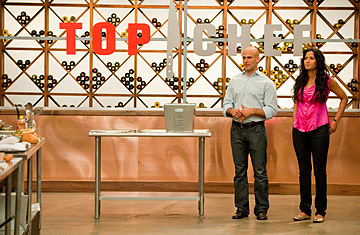
Guest judge Sam Kass, left, with Top Chef host Padma Lakshmi
The seventh season of Top Chef is under way, and in the surest sign that we've settled in for a familiar ride, last week's episode ended with the ejection of the only cheftestant with any personality. Yes, the brash and flamboyant Arnold is gone, leaving us with a dull and indistinguishable group of game-faced cooks, all jostling with each other to make the same, all-too-familiar, horrible-sounding bistro dishes. ("For my challenge I'm making pork loin with a prune compote and a harissa-mint cocktail on the side.") The challenges are all either old hat (grilling for a picnic) or silly (making baby-food versions of your dish). The setting this season, Washington, D.C., has all the excitement of a school field trip. So maybe the time has come to ask a very basic question: Is Top Chef played out?
I admit to not being an impartial observer. I'm friends with a number of people connected to the show and was almost a guest judge once. Moreover, Top Chef is not only good TV — it's just been nominated for a slew of Emmys — but the series has been good for gastronomy too. It shows people how hard chefs work, how much skill even average ones have and how serious and, yes, passionate they are about what they do. Some of them, like this season's Angelo Sosa, are even established talents. So let me be clear: I want Top Chef to succeed. But this season has been strictly from hunger. I've watched four episodes and I still can't remember all the names. Of the two cheftestants lively enough to be discernible from the general murk, one of them is now gone. And the other, the wildly arrogant Ed Cotton, I don't like. (Nor, sadly, do I hate him enough to root against him, as viewers could in past seasons with "villains" like Marcel Vigneron or Stefan Richter.) There's not even much in the way of ill will. Where is all the hate? Season 4's Lisa "the Gorgon" Fernandes is as fixed in my TV memory as Mr. Sulu, just on the basis of her superhuman hostility. The D.C. crew has yet to develop a single bona fide feud, and the season is almost one-third over.
Look a little deeper, though, and you start to see that Top Chef's shortcomings are actually its strengths. The problem, if you can call it that, is that Top Chef has always been far more reality than show. This year isn't any different. Unlike most reality programs, which are as painstakingly scripted as Pixar cartoons, Top Chef is at the mercy of its contestants. If the best-looking, most talented or (worst of all) most compelling cheftestants burn their egg, they're gone, despite the most ardent wishes of both the show's audience and its producers. And Top Chef can't just stack the deck with chefs as creative and skillful as Bryan Voltaggio, or as foxy as Casey Thompson. For one thing, they're hard to find. For another, you have to have some middling talents and average-looking people as underdogs or elimination fodder. But regardless of how appealing the characters are, the show always hews to a very tightly structured format, with a minimum of time spent peeking in on the rivals' off hours. And if you don't care about the chefs, your channel-button thumb begins to get twitchy.
And yet ... I always end up staying and watching through to the end. And you know what? At the end of every episode, even when I expected to be totally indifferent to the outcome, I still feel a surge of gratification or outrage at the final decision. Why is that? And why should Top Chef, with neither sex nor violence nor novelty, nor even an occasional profanity-laced viral video to help it along, still stay popular year after year? Seven seasons is an Ed Sullivan–like span for any reality show to keep going. And who believes this is going to be Top Chef's final season?
It's a paradox, but Top Chef's long-term success has been accomplished precisely because of its variable-voltage charge and generally low excitement quotient. Shows that thrive on fireworks, cheap thrills and one-of-a-kind personalities tend to wither and die quickly when the adrenaline begins to subside or the stars inevitably wear out their brief welcome. (Jersey Shore's the Situation is already planning his comeback.)
Because the fixed attractions on Top Chef are so rock solid, the show can serve up very thin soup in terms of the actual contest. No matter what, you're going to get Padma's glacially slow speech and queenly bearing; Tom's terse, authoritative and frequently truculent tasting notes; Gail Simmons' wholesome, approachable benevolence; and, of course, the inevitable ritual humiliation of whoever made the worst dessert. And, unlike a lot of reality shows, from which ejectees are quickly consigned back to the grim obscurity from which they were plucked, a large number of Top Chef alumni, including many cooks who lost in the early going, have been able to parlay their momentary fame into respectable careers, if not exactly superstardom. But then, the world of cooking isn't a winner-takes-all business; like weekly TV, it's about providing pleasure and sustenance, year after uneventful year.
Josh Ozersky is a James Beard Award—winning food writer and the author of The Hamburger: A History. His food video site, Ozersky.TV, is updated daily. He is currently at work on a biography of Colonel Sanders.
